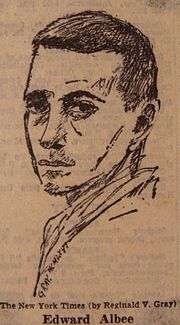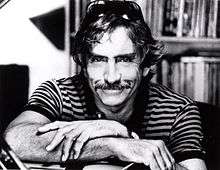Edward Albee
| Edward Albee | |
|---|---|
|
Edward Albee, photographed by Carl Van Vechten, 1961 | |
| Born |
March 12, 1928 Virginia, U.S. |
| Died |
September 16, 2016 (aged 88) Montauk, New York, U.S. |
| Occupation | Dramatist |
| Nationality | American |
| Period | 1958–2016 |
| Notable works |
Who's Afraid of Virginia Woolf? The Zoo Story A Delicate Balance The Goat, or Who is Sylvia? |
| Notable awards |
Pulitzer Prize for Drama (1967, 1975, and 1994) Tony Award (1963 and 2002) National Medal of Arts (1996) Special Tony Award (2005) America Award in Literature (2015) |
| Partner |
|
Edward Franklin Albee III (/ˈɔːlbiː/ AWL-bee; March 12, 1928 – September 16, 2016) was an American playwright known for works such as The Zoo Story (1958), The Sandbox (1959), Who's Afraid of Virginia Woolf? (1962), and A Delicate Balance (1966). Three of his plays won the Pulitzer Prize for Drama, and two of his other works won the Tony Award for Best Play.
His works are often considered as frank examinations of the modern condition. His early works reflect a mastery and Americanization of the Theatre of the Absurd that found its peak in works by European playwrights such as Samuel Beckett, Eugène Ionesco, and Jean Genet. His middle period comprised plays that explored the psychology of maturing, marriage, and sexual relationships. Younger American playwrights, such as Paula Vogel, credit Albee's daring mix of theatricality and biting dialogue with helping to reinvent the post-war American theatre in the early 1960s. Later in his life, Albee continued to experiment in works such as The Goat, or Who Is Sylvia? (2002).
Early life

Edward Albee was born in 1928. He was placed for adoption two weeks later and taken to Larchmont in Westchester County, New York, where he grew up. Albee's adoptive father, Reed A. Albee, the wealthy son of vaudeville magnate Edward Franklin Albee II, owned several theaters. His adoptive mother, Reed's third wife, Frances (Cotter), was a socialite.[1][2]
Albee attended the Clinton High School, then the Lawrenceville School in New Jersey, from which he was expelled.[1] He then was sent to Valley Forge Military Academy in Wayne, Pennsylvania, where he was dismissed in less than a year.[3] He enrolled at The Choate School (now Choate Rosemary Hall) in Wallingford, Connecticut,[4] graduating in 1946. His formal education continued at Trinity College in Hartford, Connecticut, where he was expelled in 1947 for skipping classes and refusing to attend compulsory chapel.[4]
Albee left home for good when he was in his late teens. In a later interview, he said: "I never felt comfortable with the adoptive parents. I don't think they knew how to be parents. I probably didn't know how to be a son, either."[5] More recently, he told interviewer Charlie Rose that he was "thrown out" because his parents wanted him to become a "corporate thug" and did not approve of his aspirations to become a writer.[6]
Career

Albee moved into New York's Greenwich Village,[3] where he supported himself with odd jobs while learning to write plays.[7] His first play, The Zoo Story, was first staged in Berlin. The less than diligent student later dedicated much of his time to promoting American university theatre. Most recently, he served as distinguished professor at the University of Houston, where he taught an exclusive playwriting course. His plays are published by Dramatists Play Service[8] and Samuel French, Inc.
Achievements and honors
A member of the Dramatists Guild Council, Albee received three Pulitzer Prizes for drama—for A Delicate Balance (1967), Seascape (1975), and Three Tall Women (1994). His play Who's Afraid of Virginia Woolf was selected for the 1963 Pulitzer Prize by the award's drama jury, but was overruled by the advisory committee, which elected not to give a drama award at all.[9] The two members of the jury, John Mason Brown and John Gassner, subsequently resigned in protest.[10]
Albee was elected a Fellow of the American Academy of Arts and Sciences in 1972.[11] In 1985, Albee was inducted into the American Theatre Hall of Fame.[12] In 1999, Albee received the PEN/Laura Pels International Foundation for Theater Award as a Master American Dramatist.[13] He received a Special Tony Award for Lifetime Achievement (2005);[14] the Gold Medal in Drama from the American Academy and Institute of Arts and Letters (1980); as well as the Kennedy Center Honors and the National Medal of Arts (both in 1996).[15] In 2009, Albee received honorary degree from the Bulgarian National Academy of Theater and Film Arts (NATFA), a member of the Global Alliance of Theater Schools.
In 2008, in celebration of Albee's eightieth birthday, a number of his plays were mounted in distinguished Off Broadway venues, including the historic Cherry Lane Theatre where the playwright directed two of his early one-acts, The American Dream and The Sandbox.[16]
Philanthropy
Albee established the Edward F. Albee Foundation, Inc. in 1967, from royalties from his play Who's Afraid of Virginia Woolf?. The foundation funds the William Flanagan Memorial Creative Persons Center (named after the composer William Flanagan, but better known as "The Barn") in Montauk, New York, as a residence for writers and visual artists.[17] The foundation's mission is "to serve writers and visual artists from all walks of life, by providing time and space in which to work without disturbance."[18]
Personal life and death
Albee was openly gay and stated that he first knew he was gay at age 12 and a half.[19] Albee was briefly engaged to Larchmont debutante Delphine Weissinger, and although their relationship ended when she moved to England, he remained a close friend of the Weissinger family. Growing up, he often spent more of his time in the Weissinger household than he did in his own, due to discord with his adoptive parents. Albee insisted that he did not want to be known as a "gay writer", stating in his acceptance speech for the 2011 Lambda Literary Foundation's Pioneer Award for Lifetime Achievement: "A writer who happens to be gay or lesbian must be able to transcend self. I am not a gay writer. I am a writer who happens to be gay."[20] His longtime partner, Jonathan Thomas, a sculptor, died on May 2, 2005, from bladder cancer. They had been partners from 1971 until Thomas's death. Albee also had a relationship of several years with playwright Terrence McNally during the 1950s.[21]
Albee died at his Montauk, New York, home on September 16, 2016, aged 88.[21][14][22]
Awards and nominations
|
|
Plays
Works written or adapted by Albee:[24]
|
|
Essays
- Stretching My Mind: Essays 1960–2005, (Avalon Publishing, 2005). ISBN 9780786716210.
References
- 1 2 Weber, Bruce (September 17, 2016). "Edward Albee, Trenchant Playwright for a Desperate Era, Dies at 88". The New York Times.
- ↑ Thorpe, Vanessa (September 17, 2016). "Edward Albee, Who's Afraid of Virginia Woolf? playwright, dies aged 88". The Guardian. Retrieved September 17, 2016.
- 1 2 Simonson, Robert (September 16, 2016). "Edward Albee, Towering American Playwright, Dies at 88". Playbill. Retrieved September 17, 2016.
- 1 2 Boehm, Mike (September 16, 2016). "Edward Albee, three-time Pulitzer-winning playwright and 'Who's Afraid of Virginia Woolf?' author, dies at 88". The Los Angeles Times. Retrieved September 17, 2016.
- ↑ "Edward Albee Interview". Academy of Achievement. June 2, 2005. Retrieved May 21, 2012.
- ↑ Edward Albee on Charlie Rose, May 27, 2008.
- ↑ Kennedy, Mark (September 16, 2016). "Who's Afraid of Virginia Woolf? playwright Edward Albee dead at 88". Associated Press. Retrieved September 17, 2016.
- ↑ "Dramatists Play Service". Dramatists.com. Retrieved May 21, 2012.
- ↑ "US playwright Edward Albee dies aged 88". BBC News. September 17, 2016. Retrieved September 19, 2016.
- ↑ Kihss, Peter (May 2, 1967). "Albee Wins Pulitzer Prize; Malamud Novel is Chosen". The New York Times. Retrieved September 19, 2016.
- ↑ "Book of Members, 1780–2010: Chapter A" (PDF). American Academy of Arts and Sciences. Retrieved April 6, 2011.
- ↑ "Broadway's Best". The New York Times. March 5, 1985.
- ↑ "Winners of the PEN/Laura Pels International Foundation for Theater Awards | PEN America". PEN. Retrieved September 20, 2016.
- 1 2 Howard, Adam (September 16, 2016). "Pulitzer Prize-Winning Playwright Edward Albee Dead at 88". NBC News. Retrieved September 17, 2016.
- ↑ "Who We Are". The Edward F. Albee Foundation. Retrieved September 20, 2016.
- ↑ Brantley, Ben (April 2, 2008). "A Double Bill of Plays, Both Heavy on the Bile". The New York Times. Retrieved September 17, 2016.
- ↑ Grundberg, Andy (July 3, 1988). "The Artists of Summer". The New York Times.
- ↑ "Mission & History". The Edward F. Albee Foundation. Retrieved September 19, 2016.
- ↑ Shulman, Randy (March 10, 2011). "Who's Afraid of Edward Albee?". Metro Weekly. Archived from the original on April 12, 2014.
- ↑ "Playwright Edward Albee defends 'gay writer' remarks". National Public Radio. June 6, 2011.
- 1 2 Pressley, Nelson (September 16, 2016). "Edward Albee, Pulitzer-Winning Playwright of Modern Masterpieces, Dies at 88". The Washington Post. Retrieved September 17, 2016.
- ↑ Jones, Chris (September 16, 2016). "Pulitzer Prize-winning playwright Edward Albee dies at age 88". Chicago Tribune. Retrieved September 17, 2016.
- ↑ "Recipients of the Saint Louis Literary Award". Saint Louis University. Retrieved July 25, 2016.
- ↑ "Works". Edward Albee Society. Retrieved September 20, 2016.
Further reading
- Solomon, Rakesh H. Albee in Performance. Bloomington: Indiana University Press, 2010.
External links
| Wikiquote has quotations related to: Edward Albee |
| Wikimedia Commons has media related to Edward Albee. |
- Edward F. Albee Foundation
- The Edward Albee Society
- Edward Albee scripts, 1949–1966, New York Public Library for the Performing Arts
- Edward Albee at the Internet Broadway Database

- Edward Albee at the Internet Off-Broadway Database
- Edward Albee at the Internet Movie Database
